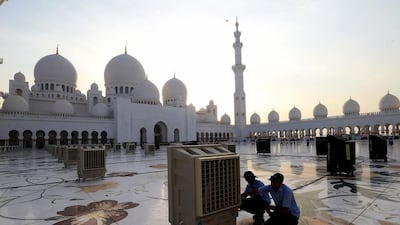ABU DHABI // More than 750,000 Muslims from around the Gulf region are expected to worship at the Sheikh Zayed Mosque in the capital during Ramadan.
Dozens of large portable air conditioning systems and large red and gold carpets were being moved into the mosque’s central courtyard on Saturday as organisers worked on putting the finishing touches before welcoming the influx of worshippers for the holy month.
A spokesman for the mosque said as between 25,000 to 35,000 people are expected per day to attend services there, Abu Dhabi Police and the UAE Armed Forces will help control the traffic.
Ambulances and a temporary medical clinic provided by the Abu Dhabi Health Services will also be on site for the duration of Ramadan.
Seven renowned imams — including Idrees Abkar, the official imam of the Grand Mosque and Abdulwali Al Arkani and Abdulmajeed Al Arkani, both of Saudi Arabia — will take turns leading taraweeh prayers. The mosque will also offer nightly lectures beginning at 10pm on different subjects related to the culture of Ramadan.
Thirteen air-conditioned Iftar tents have been erected behind the mosque to welcome labourers.
Visiting hours for non-Muslims have been reduced from 9am to 2pm, while there will be no visiting hours on Fridays throughout the holy month.
At the capital’s shopping malls and grocery shops, worshippers were also making last-minute purchases in anticipation of the start of Ramadan.
Sally Al Asmar, a 33-year-old Jordanian, was buying groceries with her 6-year-old son Khaled, who is being allowed to fast part-time this year.
“As this is his first year [of fasting], I’m asking him for just one hour a day,” said Ms Al Asmar. “In the beginning they are enthusiastic and they want to go for the complete time. If he doesn’t say, ‘no, I want to stop, I want to drink,’ then I will force him to drink because it’s not safe for him.”
Ms Al Asmar was about 8 years old when she committed to fasting for the entire month, but she says she wants her son to ease into it.
“We have to somehow convince them that they have to gradually go for it,” said Ms Al Asmar, whose other son Ali, 8, will fast for longer periods this year.
“I talk to them about the fast, about how it’s good, how we are feeding the poor people – imagine how when you are thirsty, imagine these people in Africa, you see they are looking for a drop of water. Then they see sympathy.”
Shamsa Al Mazrouie, a 20-year-old Emirati from Al Gharbia who was having lunch with her family at Marina Mall, said she was looking forward to starting Ramadan.
“If I want to be like a complete person, I should do Ramadan, I should pray and I should give food for the poor people. I should do a lot of charity, to try to give the people things without taking from them,” said Ms Al Mazrouie. “I like that ... all the family will be together in one place, watch the TV together and eat together.
“Also, Ramadan reminds us we should visit our relatives if we can. If they are in Abu Dhabi or in Al Ain, we go one or two days to them. Ramadan brings us together and complete like one hand.”
rpennington@thenational.ae

